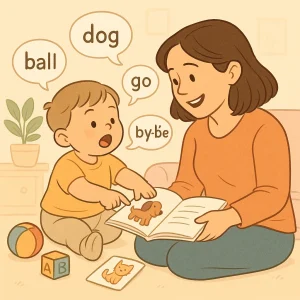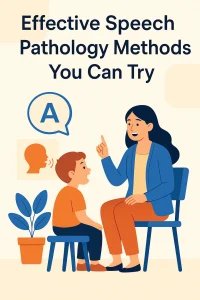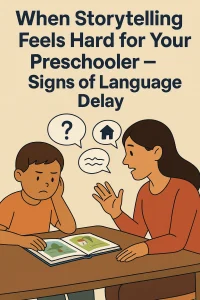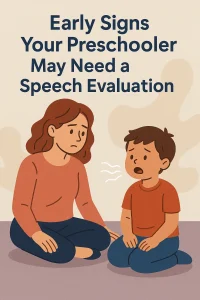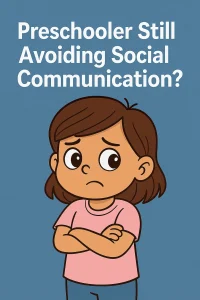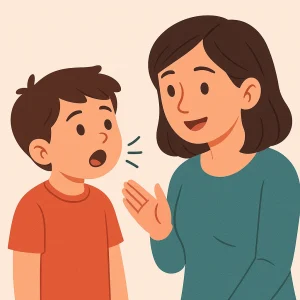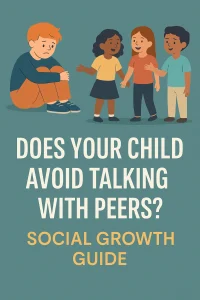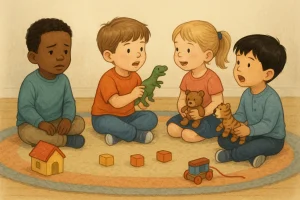Why Speech Therapy is Crucial for Down Syndrome Children
By Rajini D
Last Updated: February 24, 2024
Have you ever wondered about the unique journey of children with Down syndrome, especially when it comes to their ability to communicate and express themselves? Down syndrome, a condition where a person has an extra chromosome, affects various aspects of a child’s development, with speech and language skills being among the most significant areas impacted. This brings us to the heart of our discussion today: the pivotal role of speech therapy in nurturing the communication abilities of these incredible children.
Imagine being in a bustling playground, where the air is filled with the joyous chatter of children. Amidst this, a child with Down syndrome tries to express their thoughts and feelings but finds it challenging to be understood. This scenario is a daily reality for many families, underscoring the critical importance of speech therapy. It’s not just about articulating words more clearly; it’s about empowering these children to share their unique perspectives with the world, connect with their peers, and navigate their surroundings more independently.
Understanding Down Syndrome
Down syndrome is like having an extra piece of a puzzle that influences how a child develops. This extra piece comes in the form of an additional chromosome, specifically chromosome 21, which children with Down syndrome have three of instead of the usual two. This extra genetic material affects how their bodies and brains develop, leading to certain characteristics and challenges, especially in speech and language development.
Children with Down syndrome often experience delayed speech milestones. This isn’t just about the first words they say; it’s about how they learn to use language to express their needs, desires, and feelings. Many of these children also have low muscle tone, which can make it harder for them to produce sounds, articulate words, and even use gestures. Imagine trying to play a flute with softer, less responsive keys – it takes more effort and precision to produce the intended melody. Similarly, the low muscle tone in children with Down syndrome can make the dance of communication more challenging but not impossible.
Children with Down syndrome often experience delayed speech milestones.
The Role of Speech Therapy
his is where speech therapy steps into the spotlight, offering strategies, exercises, and a whole lot of encouragement to these young communicators. Speech therapists are like personal trainers for the muscles involved in speech and language, helping children with Down syndrome strengthen their ability to communicate effectively. Through a variety of engaging activities, therapists work on improving everything from the clarity of their words to the complexity of their sentences.
Early intervention is the golden ticket in speech therapy. Starting therapy at a young age can dramatically influence a child’s ability to communicate, paving the way for better social interactions, academic success, and overall independence. It’s about giving them the tools they need, not just to speak but to be heard and understood.
Also read: Unlocking Communication: Effective Speech Therapy for Autism
How Speech Therapy Works
Embarking on the journey of speech therapy for a child with Down syndrome can seem like navigating a new and uncharted territory for many families. Yet, understanding this process reveals a path filled with milestones and victories, big and small. At its core, speech therapy is a highly personalized journey tailored to each child’s unique needs and potential. Here’s a glimpse into how this transformative process unfolds.
Step 1: Assessments
The first step in speech therapy is thorough assessment. Speech-language pathologists (SLPs) evaluate a child’s current communication abilities, which include understanding (receptive language) and how well they can express themselves (expressive language). This assessment might involve playful interactions, structured tasks, or conversations designed to observe a variety of communication aspects. The goal is to create a detailed picture of the child’s strengths and areas where they need support.
Step 2: Goal Setting
Based on the assessment, the SLP sets specific, achievable goals. These goals are like signposts on the journey, guiding the therapy’s direction. They might range from enhancing articulation, expanding vocabulary, improving understanding of questions, or using alternative communication forms like sign language or AAC (Augmentative and Alternative Communication) devices. These goals are not set in stone; they evolve as the child grows and develops.
Step 3: Tailored Strategies
Speech therapy for children with Down syndrome isn’t one-size-fits-all. It’s a bespoke suit tailored to fit the unique contours of each child’s abilities and challenges. Strategies might include fun and engaging activities to build language skills, exercises to strengthen mouth muscles for clearer speech, or introducing sign language as a bridge to spoken language. For some, AAC devices provide a powerful tool to communicate complex ideas before their spoken language fully develops.
Collaboration is Key
A crucial aspect of speech therapy’s success is collaboration. SLPs work closely with families, educators, and other professionals involved in the child’s care. This team approach ensures that strategies from therapy sessions carry over into the child’s everyday life, providing a consistent and supportive environment for growth. Families play a vital role in integrating communication strategies into daily routines, turning every moment into an opportunity for learning and connection.
Read more: The Crucial Role of Parents in Online Speech Therapy
When to Start Speech Therapy
Identifying the right time to start speech therapy for a child with Down syndrome can be likened to catching the first rays of sunrise – it’s about seizing the earliest opportunity to illuminate their path of communication. The guiding principle here is “the earlier, the better.”
Recognizing the Signs
Parents and caregivers are often the first to notice signs that their child may benefit from speech therapy. These signs might include:
- Delayed milestones: Such as babbling later than expected, having a limited number of words by age two, or difficulty combining words into simple sentences as they grow.
- Feeding difficulties: Challenges with breastfeeding, bottle-feeding, or transitioning to solid foods can be early indicators of oral-motor skill development issues.
- Limited interaction: Shows less interest in interactive games like peek-a-boo or does not respond to their name by their first birthday.
- Expressing frustration: If a child shows signs of frustration due to the inability to communicate needs or desires, it might be time to explore how speech therapy can help.
Embracing Early Intervention
The adage “the earlier, the better” is more than just a saying in the realm of speech therapy; it’s a beacon of proactive hope. Early intervention can significantly influence a child’s ability to develop effective communication skills. Starting speech therapy early doesn’t just address speech and language development; it also fosters feeding skills, social interaction, and emotional expression.
However, it’s crucial to navigate this advice without casting shadows of guilt or worry over parents who might feel they’ve missed the “ideal” time to start. Whether your child begins speech therapy in infancy, toddlerhood, or later, each step taken is a step forward. The focus should always be on the progress and potential, not on perceived delays or missed timings.
Read more about on The Ideal Age to Begin Online Speech Therapy: Insights for Parents
Signs Your Child Might Benefit from Speech Therapy
| Age Range | Expected Milestones | Signs to Watch For |
|---|---|---|
| 0-6 months | Coos and makes pleasure sounds | Limited or no cooing; does not respond to loud noises |
| 6-12 months | Babbling uses sounds like “baba.” | Limited babbling; does not use sounds to get attention |
| 1-2 years | Says first words, starts combining words | Fewer than 50 words by age 2; difficulty combining words |
| 2-3 years | Uses 2-3 word sentences, vocabulary burst | Less than 100 words; not consistently combining 2 words |
| 3-4 years | Understands simple questions, tells stories | Difficulty following simple instructions; unclear speech |
| 4-5 years | Speaks sentences of 5-6 words, clear speech | Difficulty being understood by strangers; struggles with story-telling |
Supporting Your Child’s Journey
Supporting your child’s speech and language development at home can be a rewarding journey filled with shared discoveries and milestones. Here are some practical tips for parents to nurture their child’s communication skills, ensuring you play a proactive role in their development.
Create a Language-rich Environment
- Talk about the day: Narrate your activities together, describe what you’re doing, and express your thoughts aloud. This constant exposure to language helps your child to absorb words and their meanings.
- Read together: Spend time reading to your child daily. Choose books with bright pictures and simple sentences to engage their interest and stimulate language development.
- Sing songs and nursery rhymes: Music and rhythm are not only enjoyable but also effective in teaching language patterns and new vocabulary.
Encourage Communication
- Use simple, clear words when talking to your child. Encourage them to mimic sounds and words.
- Celebrate attempts to communicate, whether through words, gestures, or expressions. Showing enthusiasm for their attempts encourages more attempts.
- Practice patience: Give your child time to respond, avoiding the temptation to speak for them. Pausing allows them to process and attempt to communicate.
Activities to Support Speech and Language Development at Home
| Activity Type | Description | How Wellness Hub Supports |
|---|---|---|
| Interactive Reading | Use picture books to encourage word identification and storytelling skills. | Lists of recommended books; Tips for engaging reading sessions. |
| Music and Singing | Sing songs and nursery rhymes to improve rhythm and phonemic awareness. | Guides to child-friendly songs; Benefits of music in language development. |
| Play-Based Learning | Engage in role-play and use toys to stimulate language use in various scenarios. | Ideas for educational play activities; Toy recommendations. |
| Sign Language Basics | Introduce simple sign language to support communication before speech. | Resources on starting sign language: Online sign language courses. |
| Articulation Games | Play games that focus on the pronunciation of challenging sounds. | Articulation game ideas; Apps and digital resources for speech clarity. |
| Daily Routines | Incorporate speech and language practice into daily routines like meals and dressing. | Tips for embedding language development into routines. |
Explore more on Engaging Home-Based Occupational Therapy Activities for Children with Autism.
Finding the Right Speech Therapist
Selecting the right speech therapist is crucial for your child’s success and confidence in their ability to communicate. Here are key considerations when choosing a therapist:
- Experience with Down syndrome: Look for professionals with specific experience and training in working with children with Down syndrome, as they will be familiar with the unique challenges and strengths these children may have.
- Approach and methods: Ensure the therapist’s approach aligns with your child’s needs and your family’s values. An initial consultation can give you insight into their methods and how they engage with children.
- Recommendations and reviews: Seek out recommendations from other parents of children with Down syndrome or consult organizations dedicated to Down syndrome for referrals.
Go through our article on Best Online Speech Therapy in Hyderabad
Conclusion
Speech therapy is more than just improving speech clarity; it’s about enhancing the overall quality of life for children with Down syndrome, providing them with the tools to express their thoughts, engage with the world around them, and enjoy meaningful social interactions. The role of speech therapists, in collaboration with families and other professionals, is indispensable in this journey, offering guidance, support, and expertise every step of the way.
At Wellness Hub, we understand the hopes and concerns that come with parenting a child with Down syndrome. That’s why we’re committed to connecting families with the resources, professionals, and support they need to navigate the path of speech therapy. Our network of experienced speech therapists is dedicated to working with children with Down syndrome, tailoring their approaches to meet each child’s unique needs.
Frequently Asked Questions
1. What is Down Syndrome?
Down syndrome is a genetic condition where a person has an extra copy of chromosome 21. This extra chromosome affects a child’s physical and developmental milestones, including speech and language development.
2. Why is Speech Therapy Important for Children with Down Syndrome?
Speech therapy is crucial for children with Down syndrome as it helps address common communication challenges, improves speech clarity, enhances language skills, and supports effective social interactions. Early intervention can significantly impact their overall development and quality of life.
3. When Should Speech Therapy for Down Syndrome Begin?
The earlier, the better. Starting speech therapy as soon as possible is recommended to take advantage of a child’s developmental stages. However, it’s never too late to begin speech therapy, and benefits can be seen at any age.
4. How Does Speech Therapy Benefit Children with Down Syndrome?
Speech therapy benefits children with Down syndrome by helping them improve articulation, expand vocabulary, enhance understanding and use of language, and develop alternative communication methods, such as sign language or AAC (Augmentative and Alternative Communication) devices.
5. What Are the Signs That a Child with Down Syndrome Needs Speech Therapy?
Signs include delayed speech milestones, difficulty with clear articulation, challenges in understanding or using language, and frustration when trying to communicate. Parents might also notice feeding difficulties, which can be related to oral-motor skill development.
6. How Can Parents Support Their Child’s Speech and Language Development at Home?
Parents can create a language-rich environment, read and sing with their child, practice clear and simple communication, and incorporate speech therapy exercises in daily routines. Engaging in interactive play and encouraging any attempt at communication can also be beneficial.
7. How to Choose the Right Speech Therapist for a Child with Down Syndrome?
Look for a speech therapist with experience in Down syndrome, consider their approach and methods, and seek recommendations from other parents or professionals. Wellness Hub can connect families with qualified speech therapists specializing in Down syndrome.
8. Can Speech Therapy Be Conducted at Home?
Yes, speech therapy can be conducted at home, especially with the guidance of a professional speech therapist. Many therapists offer home-based strategies and exercises for parents to practice with their children.
9. What Role Do Parents Play in Speech Therapy?
Parents play a critical role in speech therapy by reinforcing strategies and exercises at home, providing a supportive environment, and collaborating with speech therapists to ensure the therapy aligns with their child’s needs.
10. Where Can I Find Resources and Support for Speech Therapy?
Wellness Hub offers a wealth of resources and support for families seeking speech therapy for children with Down syndrome, including access to experienced professionals, informative articles, and community support.
About the Author:
Rajini Darugupally
M.Sc., Speech-Language Pathologist (9+ years of experience)
Rajini is a passionate and dedicated Speech-Language Pathologist with over 9+ years of experience, specializing in both developmental speech and language disorders in children and rehabilitation in adults. Driven by a desire to empower each individual to find their voice, Rajini brings a wealth of experience and a warm, genuine approach to therapy.
Currently, at Wellness Hub, she thrives in a team environment that values innovation, compassion, and achieving results for their clients.
Connect with Rajini to learn more about how she can help you or your loved one find their voice.
Book your Free Consultation Today
Parent/Caregiver Info:
Client’s Details:
* Error Message
